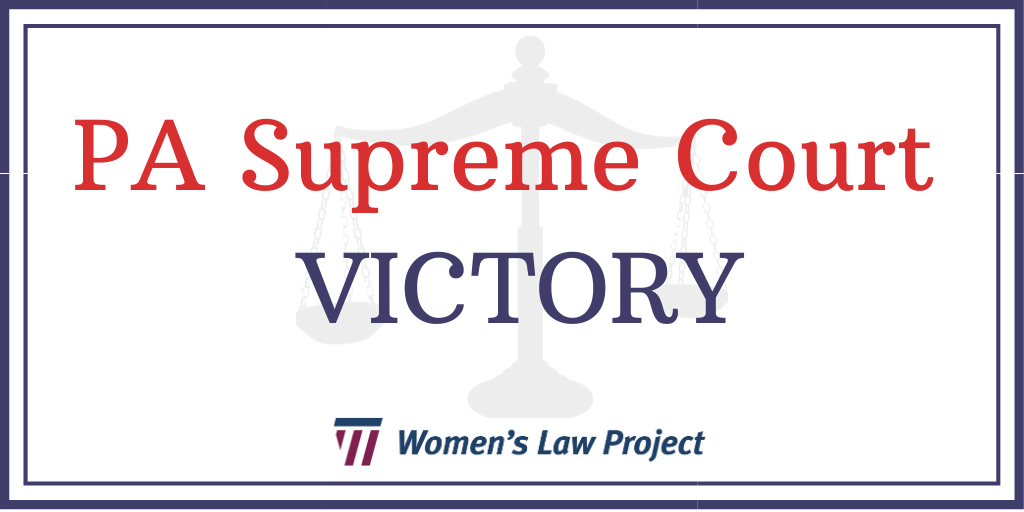
Today, the Pennsylvania Supreme Court issued a plurality opinion in Commonwealth of Pennsylvania v. Patrick Tighe agreeing that the trial court’s rejection of a defendant’s request to personally cross-examine his minor sexual assault victim during trial did not violate the defendant’s constitutional rights.
The Pennsylvania Supreme Court affirmed the Superior Court’s decision that the defendant’s constitutional rights were not violated when the trial court imposed a reasonable limitation on the defendant’s right to self-representation, given that the defendant violated a no-contact bail condition by calling the victim to ask “Why are you doing this to me?” and beg that she not “put [him] in jail for life.”
The Women’s Law Project filed an amicus (“friend of the court”) brief on behalf of twenty-three organizations dedicated to improving societal responses to sexual violence supporting the trial court’s decision to prohibit an adult defendant accused of rape from directly cross-examining his underage victim while at trial.
“Today’s opinion correctly concluded that the defendant’s right to represent himself at trial does not reasonably extend to the right to personally interrogate a child victim of rape in light of his behavior,” says WLP attorney Amal Bass, who filed the brief and co-drafted it with Teri Garvey, Attorney Advisor at AEquitas.
“Importantly, the court left the door open to limiting cross where there is specific evidence that a particular victim would be traumatized by personal cross-examination, potentially regardless of the victim’s age,” says AEquitas Attorney Advisor Garvey.
In our brief, we argued that requiring standby counsel to conduct cross-examination—as was done in Tighe’s case–otherwise directed by the pro se defendant balances the defendant’s right to advance the evidence, arguments, and positions of their choice with the important goals of reducing emotional harm to victims and upholding the integrity of the justice system.
Social science research shows that interacting with the criminal justice system can exacerbate emotional trauma for victims of violence, especially children. The importance of protecting victims of domestic violence, sexual violence, and stalking from personal contact with their abusers has also been consistently recognized by this Commonwealth.
This case went to the Supreme Court because Tighe appealed a decision that barred him from personally cross-examining his teenage victim on the stand.
In addition to requesting permission to personally interrogate the victim, Tighe also insisted that he should have the right to not only personally cross-examine the victim, but also to interrogate her about her sexual history–despite a rape shield statute that explicitly prohibits such questions.
The trial court refused Tighe’s request. Instead, the defendant was allowed to write questions to be asked of the victim, while standby counsel did the actual questioning.
The lower court’s decision was based on many factors including the victim’s age (16 at the time of the trial) and circumstances of the case, including the fact the defendant violated a no-contact bail condition by calling the victim to ask “Why are you doing this to me?” and beg that she not “put [him] in jail for life.”
The victim testified that the actions of the defendant, a family friend she once knew as “Uncle Pat,” scared her and made her feel she was “in danger.”
Tighe was convicted of rape, involuntarily deviate sexual intercourse, and sexual assault and sentenced to up to 40 years.
Thank you to fellow amici AEquitas, Atlanta Women for Equality California, Women’s Law Center Chicago, Alliance Against Sexual Exploitation, Connecticut Women’s Education and Legal Fund, End Rape on Campus, Equal Rights Advocates, Freedom Network USA, Futures Without Violence, Gender Justice, Harvard Law School Gender Violence Legal Policy Workshop, Legal Momentum, the Women’s Legal Defense and Education Fund, Legal Voice, National Crime Victim Law Institute, National Crittenton, National Organization for Women Foundation, National Women’s Law Center, Pennsylvania Coalition Against Domestic Violence, Southwest Women’s Law Center, SurvJustice, Victim Rights Law Center, and Women’s Law Center of Maryland.
The Women’s Law Project is the only public interest law center in Pennsylvania devoted to advancing the rights of women and girls.
Sign up for WLP’s Action Alerts here. Stay up to date on issues and policy by subscribing to our blog, following us on twitter and liking us on Facebook.
We are a non-profit organization. Please consider supporting equal rights for women and girls by making a one-time donation or scheduling a monthly contribution.

